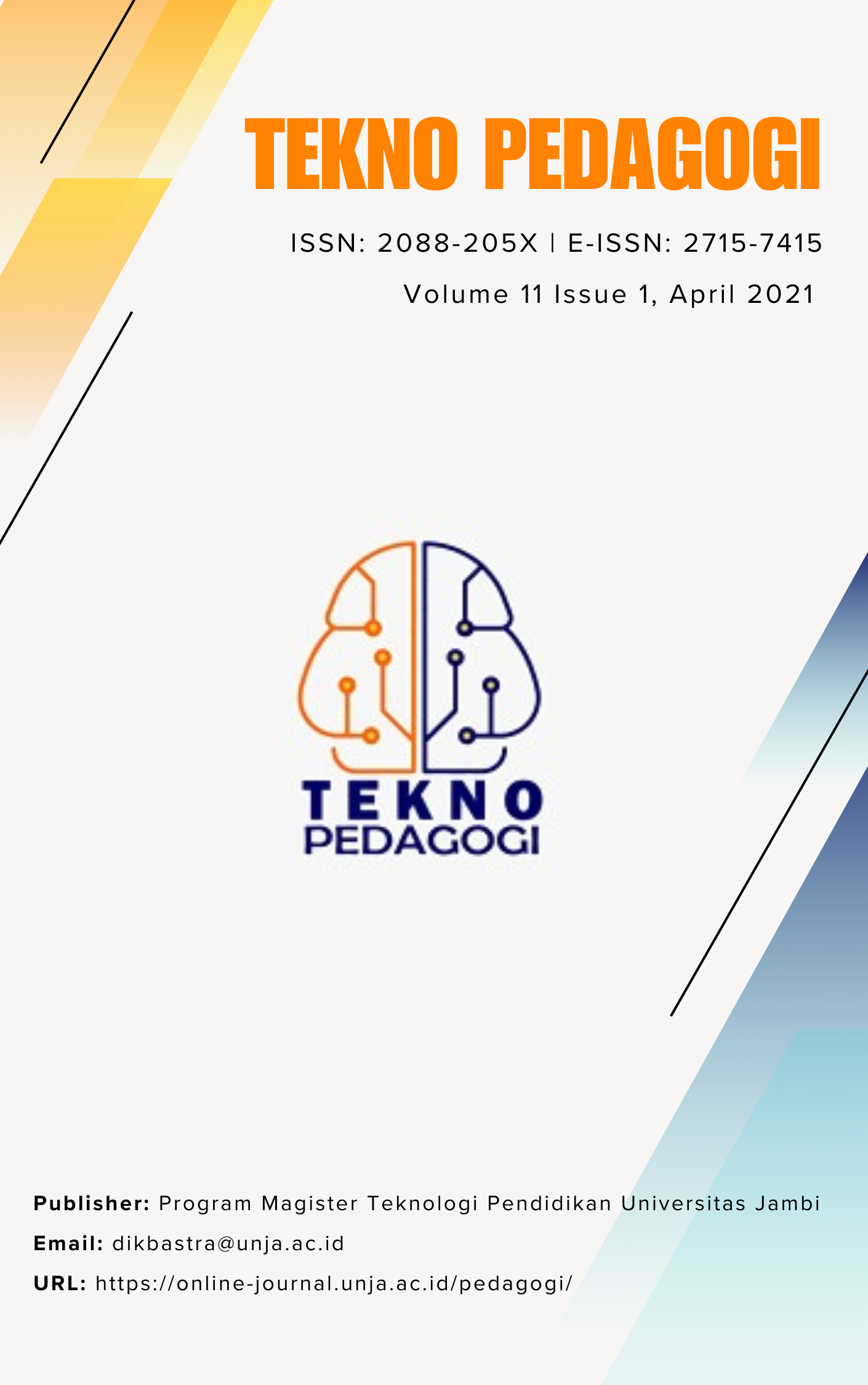The Effect of Implementing Authentic Assessment on Student Learning Activities and Outcomes
DOI:
https://doi.org/10.22437/teknopedagogi.v11i1.32705Keywords:
Authentic Assessment, Effect, Implementing, Learning Activities, Learning OutcomesAbstract
This study investigates the effect of implementing authentic assessment on student learning activities and outcomes in the context of elementary school history education. The research design involved an experimental approach, with one group receiving authentic assessment and another group receiving conventional assessment. Participants were fifth-grade students from a specific school. Data collection methods included pre-test and post-test assessments, observation of student activities during lessons, and a questionnaire to gauge student attitudes toward the learning process. The findings revealed that students who underwent authentic assessment demonstrated higher levels of engagement in learning activities compared to those subjected to conventional assessment. Additionally, significant improvements were observed in the learning outcomes of students in the authentic assessment group. This suggests that authentic assessment not only fosters greater student involvement in the learning process but also enhances their understanding and retention of the subject matter. These results underscore the importance of incorporating authentic assessment practices in educational settings to promote more meaningful and effective learning experiences for students.
Downloads
References
Agustina, M. (2021). Identifikasi Minat Belajar Siswa PAUD dalam Pelajaran Berhitung. Journal of Basic Education Research, 2(2), 51–54. https://doi.org/10.37251/jber.v2i2.193
Ariyanto, M., Kristin, F., & Anugraheni, I. (2018). Penerapan Model Pembelajaran Problem Solving untuk Meningkatkan Kemampuan Berpikir Kritis dan Hasil Belajar Siswa. Jurnal Guru Kita, 2(3), 106–115. https://jurnal.unimed.ac.id/2012/index.php/jgkp/article/view/10392/9331
Arliani, Y. (2021). Korelasi antara Sikap terhadap Hasil Belajar Peserta Didik pada Mata Pelajaran Fisika. Schrödinger: Journal of Physics Education, 2(3), 58–63. https://doi.org/10.37251/sjpe.v2i3.471
Bahira, B. (2021). Pengaruh Ekspektasi Orang Tua pada Anak terhadap Prestasi Belajar Pendidikan Agama Islam Kelas VII. Jurnal Pendidikan Agama Islam Indonesia (JPAII), 2(1), 13–15. https://doi.org/10.37251/jpaii.v2i1.590
Darwis, D. (2021). Implementasi Nilai-nilai Keteladanan Rasulullah dalam Pendidikan Agama Islam terhadap Pembentukan Perilaku Peserta Didik Kelas X. Jurnal Pendidikan Agama Islam Indonesia (JPAII), 2(1), 16–18. https://doi.org/10.37251/jpaii.v2i1.591
Dezaneru, R., & Kurniawan, N. (2021). Korelasi Sikap Siswa Dan Disiplin Siswa Terhadap Pelajaran Ipa Di Smp Muaro Jambi. Integrated Science Education Journal, 2(1), 20–27. https://doi.org/10.37251/isej.v2i1.128
Dirgantoro, K. P. S. (2018). Kompetensi Guru Matematika Dalam Mengembangkan Kompetensi Matematis Siswa. Scholaria: Jurnal Pendidikan Dan Kebudayaan, 8(2), 157–166. https://doi.org/10.24246/j.js.2018.v8.i2.p157-166
Dumford, A. D., & Miller, A. L. (2018). Online learning in higher education: exploring advantages and disadvantages for engagement. Journal of Computing in Higher Education, 30(3), 452–465. https://doi.org/10.1007/s12528-018-9179-z
Fadila, N. (2021). Pengembangan Modul Matematika Berbasis Accelerated Learning pada Materi Himpunan di SMPN 1 Kota Jambi. Journal Evaluation in Education (JEE), 2(3), 107–111. https://doi.org/10.37251/jee.v2i3.216
Handayani, F. (2021). Deskripsi Sikap Siswa Kelas X MIPA terhadap Mata Pelajaran Fisika. Schrödinger: Journal of Physics Education, 2(1), 20–23. https://doi.org/10.37251/sjpe.v2i1.457
Harahap, S. (2020). Identifikasi Kreativitas Siswa Terhadap Mata Pelajaran IPA. Integrated Science Education Journal, 1(1), 16–22. https://doi.org/10.37251/isej.v1i1.21
Hasanah, N. (2021). Perbedaan Model Pembelajaran Kooperatif Tipe Team Assisted Individualization (TAI) dengan Model Konvensional Terhadap Hasil Belajar Siswa. Journal of Social Knowledge Education (JSKE), 2(2), 42–44. https://doi.org/10.37251/jske.v2i2.389
Kruit, P. M., Oostdam, R. J., van den Berg, E., & Schuitema, J. A. (2018). Assessing students’ ability in performing scientific inquiry: instruments for measuring science skills in primary education. Research in Science and Technological Education, 36(4), 413–439. https://doi.org/10.1080/02635143.2017.1421530
Marwiyah, M. (2021). The Effect of Using Storytelling On Student’ Speaking Skill at the Eight Grades of SMPN 28 Muaro Jambi. Indonesian Journal of Education Research (IJoER), 2(2), 28–32. https://doi.org/10.37251/ijoer.v2i2.520
Novalia, M. (2020). Pengaruh Model Kepemimpinan terhadap Kesejahteraan dan Produktivitas Kerja Karyawan dalam Perspektif Ekonomi Islam. Journal of Social Knowledge Education (JSKE), 1(4), 115–119. https://doi.org/10.37251/jske.v1i4.378
Raffaghelli, J., Ghislandi, P., Sancassani, S., Canal, L., Micciolo, R., Balossi, B., Bozzi, M., Di Sieno, L., Genco, I., Gondoni, P., Pini, A., & Zani, M. (2018). Integrating MOOCs in physics preliminary undergraduate education: beyond large size lectures. Educational Media International, 55(4), 301–316. https://doi.org/10.1080/09523987.2018.1547544
Rusdi, Fauzan, A., Arnawa, I. M., & Lufri. (2020). Designing Mathematics Learning Models Based on Realistic Mathematics Education and Literacy. Journal of Physics: Conference Series, 1471(1). https://doi.org/10.1088/1742-6596/1471/1/012055
Shukurov. (2021). The Development Of A Healthy Culture Of Living For Students-Youngstres Through Physical Education And Sports As A Pedagogical Problem. International Multidisciplinary Conference, 1(1), 10–17.
Susilawati, N. (2021). Merdeka Belajar dan Kampus Merdeka Dalam Pandangan Filsafat Pendidikan Humanisme. Jurnal Sikola: Jurnal Kajian Pendidikan Dan Pembelajaran, 2(3), 203–219. https://doi.org/10.24036/sikola.v2i3.108
Sutrimo, S. (2021). Analisis Berpikir Kreatif Siswa Independence Dalam Menyelesaikan Soal Open Ended Pada Materi Sistem Persamaan Linear Dua Variabel. Indonesian Journal of Education Research (IJoER), 2(2), 46–50. https://doi.org/10.37251/ijoer.v2i2.524
Syamsuddin, A., Babo, R., Sulfasyah, & Rahman, S. (2021). Mathematics learning interest of students based on the difference in the implementation of model of thematic learning and character-integrated thematic learning. European Journal of Educational Research, 10(2), 581–591. https://doi.org/10.12973/EU-JER.10.2.581
Veronica, N. (2018). Permainaan Edukatif dan Perkembangan Kognitif Anak Usia Dini. PEDAGOGI: Jurnal Anak Usia Dini Dan Pendidikan Anak Usia Dini, 4(2), 49–55.
Wickens, J. D. J., & Norris, D. H. (2018). The imperative of soft skill development in preventive conservation practice and training. Studies in Conservation, 63, S301–S306. https://doi.org/10.1080/00393630.2018.1486078
Winda, F. R., & Firmansyah, R. (2021). Pengaruh Kegemaran Membaca Saintifik Terhadap Sikap Terhadap IPA di Sekolah Menengah Pertama. Journal Evaluation in Education (JEE), 2(2), 73–81. https://doi.org/10.37251/jee.v2i2.155
Downloads
Published
How to Cite
Issue
Section
License
Copyright (c) 2021 Lestari Lestari

This work is licensed under a Creative Commons Attribution 4.0 International License.





